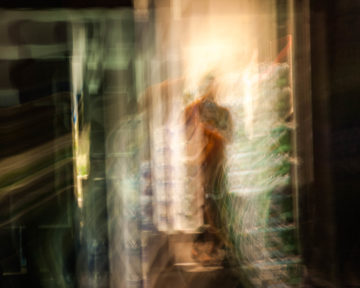by Bill Benzon
About a week and a half ago I was scrolling through my Twitter feed and saw one of those tweets that was commenting on something about which I was clueless. Meta? What’s that about? Such tweets are common enough. I generally never find out what they’re about. But this little mystery resolved itself soon enough.
It seems that Mark Zuckerberg had proclaimed himself Emperor of the Metaverse. Not in so many words, of course, but for the purposes of this essay, yes, that’s what happened.
I had a vague idea what “metaverse” referred to and learned a bit more as I read articles, mostly skeptical, about it. Many of those articles traced the word to Snow Crash, a dystopian science fiction novel Neal Stephenson published in 1992.
I may or may not have read it. It’s something I might well have read, but I don’t recall it
But the story I want to tell, the web I want to weave, is much older. It starts with an idea Weston La Barre tossed out in 1970 in The Ghost Dance. La Barre observed:
… the Australian Bushman themselves equate dream-time with the myth-time that is mysteriously brought back in ritual; myth is as timeless as the unconscious mind. It is the delectability of dreams that makes them desirable, and it is their desirability that (along with lowered critical threshold) that gives them their intense “reality” and conviction. The fact that he dreams first forces on man the need to epistemologize.
Our own view of dreams is so thoroughly psychologized that we can easily think of them as just something the mind/brain does. How do dreams appear to people who, lacking the explanatory and theoretical machinery of modern psychology and neuroscience, cannot psychologize them? It seems to me that people lacking the interpretive buffering of this psychologized view of the world might well see dreams as genuine journeys to another realm. And if they also had the benefit of psychedelics, those experiences would reinforce the metaphysical imperatives of dream experience. The two experiential realms would supplement one another. Of course we have no way of knowing whether or not that is true, but it seems plausible.
Somewhat more recently, within historical time, in the fifth century BCE, Plato followed the metaphysical impulse into his well-known allegory of the cave: We are as prisoners chained deep in a cave where we face a wall on which we see shadows passing by. We take those shadows to be real; they are all we know.
Still more recently, in seventeenth century France, Rene Descartes sought to establish some idea which is beyond doubt. He laments that his senses often deceive him. He notes that even when dreaming he is often convinced he experiences real objects. He further imagines that he is being manipulated by a malignant deity. But, upon further reflection, he realizes that, regardless of the truth states of this or that perception or idea, there can be no doubt that he is thinking: Cogito ergo sum, I think, therefore I am.
Whatever one may think of Descartes’ arguments, we’ve been chewing on them ever since. And not only in philosophy. In 1999 the Wachowskis released The Matrix, a science fiction film in which Descartes’ malignant deity has become an elaborate construction in which AIs keep human bodies in liquid-filled pods while stimulating their brains with a completely artificial computer-generated world.
Four years later, in 2003, philosopher Nick Bostrom published “Are You Living in a Computer Simulation?” in Philosophical Quarterly. Bostrom argues that most likely we are living in a computer simulation created by “posthumans” who, for whatever reason, have decided to run simulations of their ancestral history. We are in one of those simulations and out there or up there or over there, whatever, are the creatures who have created us.
Bostrom constructs his argument carefully, offering various estimates of the computational capacity of the human brain as well as estimates of computational capacity likely to be available in the future. The upshot is that at some point our descendants are likely to have sufficient capacity to simulate millions and billions of mind and so to simulate us. The argument creeped me out when I first read it.
Moreover the likes of Elon Musk, Neil deGrasse Tyson, and many others find it plausible. Musk, as we all know, is the founder of Tesla and SpaceX, intends to establish a colony on Mars, and is at the moment the richest man in the world. Tyson is the director of the Hayden Planetarium in New York City and perhaps the best-known living science educator.
Let us assume that the simulation argument is valid. What does that imply about this Metaverse? As I understand it the Metaverse is an immersive virtual reality, a Star Trek holodeck one enters though a headset and haptic/kinetic body suit. It is the next Big Thing. A total reality simulation. Beyond the web and AI to the max.
Everything about it can be monetized. At the beginning of the 20th century Einstein showed us that matter and energy are interconvertable. Zuckerberg aims to transmute people’s dreams into Meta’s (that is, Facebook’s) cash in the 21st century.

Who knows? Beyond that perhaps the Metaverse will turn out to be a backdoor into the simulation machinery that runs our world. Maybe it is, in effect, Neo’s red pill to reality. Thus when we step into the Metaverse we’ll be able to gaze upon our posthuman creators and attempt to figure out whether they too are simulations.
* * * * *
Do I believe that? No. I don’t.
No doubt there’s interesting technology to be made. But I fear that we don’t know what we’re doing or why. We’re becoming lost in our technology.
That’s what the Metaverse is.
